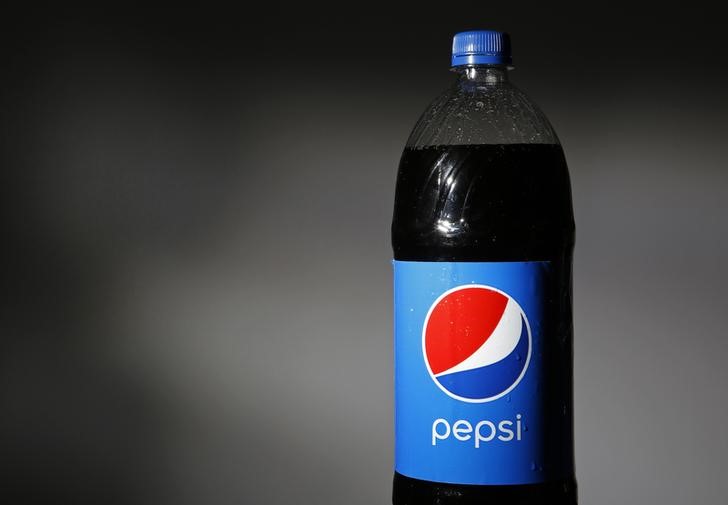On Monday, Deutsche Bank (ETR:DBKGn) adjusted its outlook on PepsiCo (NASDAQ:PEP) shares, lowering the price target from $185 to $180, while maintaining a Hold rating on the stock. The revision comes as investors adopt a more neutral to cautious stance toward the beverage and snack giant, reflecting concerns over recent performance and future prospects.
The decrease in the price target is attributed to sluggish quarter-to-date U.S. consumption trends, particularly in PepsiCo's Frito-Lay North America (FLNA) division, which have dampened expectations for volume growth. Additionally, the recent devaluations in Latin American currencies, such as the Mexican peso and Brazilian real, pose potential risks to the company's earnings, given that these could impact the strength in constant dollar consumption in these markets.
Deutsche Bank noted that while there was previously some flexibility within PepsiCo's full-year guidance, mainly within planned Selling, General and Administrative (SG&A) expenses, there is now growing pressure on the company to deliver its projected organic sales growth and earnings per share (EPS) for fiscal year 2024. The current market conditions might necessitate increased productivity and cost containment measures in the second half of the year.
The analyst's comments reflect the challenges PepsiCo faces in meeting its financial targets amidst a complex market environment. The factors leading to the revised price target include both internal performance metrics and external economic influences that could affect the company's profitability.
Investors and market watchers will be closely monitoring PepsiCo's upcoming fiscal second-quarter results, as well as the company's strategies to counteract the pressures identified by Deutsche Bank. The company's stock performance has recently seen a decline, with an 8% drop compared to the S&P 500's 3% gain over the last month, signaling heightened investor scrutiny.
In other recent news, PepsiCo has been making significant moves in the market. The company recently announced a 7% increase in its quarterly dividend, marking the 52nd consecutive annual rise in dividends. This move aligns with the company's earlier statements about boosting its annualized dividend to $5.42 per share from $5.06.
On another front, PepsiCo has agreed to waive a change of control clause in its bottling arrangements with Britvic (LON:BVIC), potentially paving the way for Carlsberg (CSE:CARLb)'s prospective acquisition of the British soft drinks maker. This waiver will take effect if Carlsberg's acquisition of Britvic is endorsed by Britvic's board and successfully completed.
In the world of investments, David Trone, the congressional representative for Maryland's 6th district, sold off a portion of his PepsiCo stocks held in an Insurance Trust. The transaction was valued between $50,001 and $100,000.
Furthermore, Jefferies has adjusted its outlook on PepsiCo shares, increasing the price target to $211 from the previous $209 while maintaining a Buy rating on the stock. The firm anticipates that with new management's focus on margin prioritization, PepsiCo's North America Beverages margins could begin to see a positive turn.
InvestingPro Insights
Despite the cautious stance from Deutsche Bank, PepsiCo's long-term investors might find solace in the company's strong historical commitment to shareholder returns. According to InvestingPro Tips, PepsiCo has not only raised its dividend for 51 consecutive years but also maintained dividend payments for 54 consecutive years. This consistency reflects the company's robust financial health and its ability to generate cash flows that can sufficiently cover interest payments. Additionally, with a gross profit margin of over 54% in the last twelve months as of Q1 2024, PepsiCo demonstrates impressive profitability in the Beverages industry.
From a valuation perspective, PepsiCo's P/E ratio stands at 25.03, with an adjusted P/E ratio of 22.73 for the last twelve months as of Q1 2024, indicating a trading position at a lower P/E ratio relative to near-term earnings growth. Moreover, the PEG ratio, a metric that relates the P/E ratio to the growth rate of the company's earnings, is at a favorable 0.63, suggesting that the stock may be undervalized based on its earnings trajectory.
For investors looking to delve deeper into PepsiCo's financials and performance, InvestingPro offers additional tips and insights that could help in making a more informed investment decision. With the use of the coupon code PRONEWS24, users can get an additional 10% off a yearly or biyearly Pro and Pro+ subscription, which includes access to comprehensive analysis and data. There are 10 more InvestingPro Tips available for PepsiCo, which could provide further clarity on the company's market position and future outlook.
This article was generated with the support of AI and reviewed by an editor. For more information see our T&C.
Should you invest $2,000 in PEP right now?
With PEP making headlines, savvy investors are asking: Is it truly valued fairly? In a market full of overpriced darlings, identifying true value can be challenging. InvestingPro's advanced AI algorithms have analyzed PEP alongside thousands of other stocks to uncover hidden gems. These undervalued stocks, potentially including PEP, could offer substantial returns as the market corrects. In 2024 alone, our AI identified several undervalued stocks that later surged by 30 or more. Is PEP poised for similar growth? Don't miss the opportunity to find out.
Reveal Undervalued Stocks Now